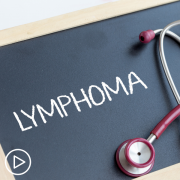Should DLBCL Treatment Begin Immediately?
Should DLBCL Treatment Begin Immediately? from Patient Empowerment Network on Vimeo.
For a newly diagnosed diffuse large B-cell lymphoma (DLBCL) patient, should treatment begin right away? Expert Dr. Loretta Nastoupil discusses the optimal time to begin treatment and how it can vary by patient situation.
Dr. Loretta Nastoupil is Director of the Lymphoma Outcomes Database in the Department of Lymphoma/Myeloma at The University of Texas MD Anderson Cancer Center. Learn more about Dr. Nastoupil, here.
See More From The Pro-Active DLBCL Patient Toolkit
Related Programs:

|

|

|
Transcript:
Katherine:
Does treatment typically start right away?
Dr. Nastoupil:
Hopefully. So, what I mean by that is everyone has to have a diagnosis. And a common story that I hear is that patients generally know when they’re not doing well. They may not be able to pinpoint I have lymphoma.
But they usually will see a primary care doctor or depending on the location of a lymph node if it’s palpable. Oftentimes, men when they’re shaving will pick up a lymph node in the neck. Or women if they’re having a mammogram will pick up a lymph node in the axillae or under the arm. So, that may lead to further investigation based off the location of a lymph node.
Or it may just be those constitutional symptoms where people aren’t feeling well, and a primary care doctor is their first stop. Lymphoma is rare. So, usually it’s a diagnosis of exclusion or something that we eventually get around to. That is important, but it’s not that important.
So, what I mean by that is I hope patients don’t have any guilt or regret if they’ve been sitting on symptoms for a while or even if their primary care doctor missed signs and symptoms of lymphoma because, again, it’s not very specific. There are a lot of things that can cause similar presentations.
But once we have imaging that is suggestive of lymphoma and then we have a diagnosis that’s rendered, again, followed by a biopsy, generally, then it is important that they seek care.
And they get that care in a timely fashion. What’s kind of interesting is the longer time from diagnosis to the initiation of treatment in diffuse large B-cell lymphoma is usually associated with a better prognosis. So, that’s sort of counterintuitive.
One would think that the sooner you get started on treatment, the better your outcome will be. I think the challenge with interpreting that data is that the longer time from diagnosis to initiation of treatment usually means that that patient’s disease is one that lends itself to the affordability of time to be seen by specialists, have all of your staging studies completed, have a return visit to go over all those results and have a shared decision-making process in terms of deciding what’s the best treatment for you, and then getting started on that treatment.
So, those patients where that is agreeable and acceptable, they’re probably going to do very well.
For the patients who are really sick and they need to get started on treatment sooner rather later as a result of their disease putting them at risk, either as a result of organs not functioning well or substantial symptom burden as a result of their disease, then they need to get started. So, that’s usually why their course from diagnosis to treatment is generally shorter.
So, again, it all kind of depends on a given situation. But with diffuse large B-cell lymphoma, I tell patients usually within three months of knowing you have lymphoma, we need to get you on treatment, or you’re going to be sick










